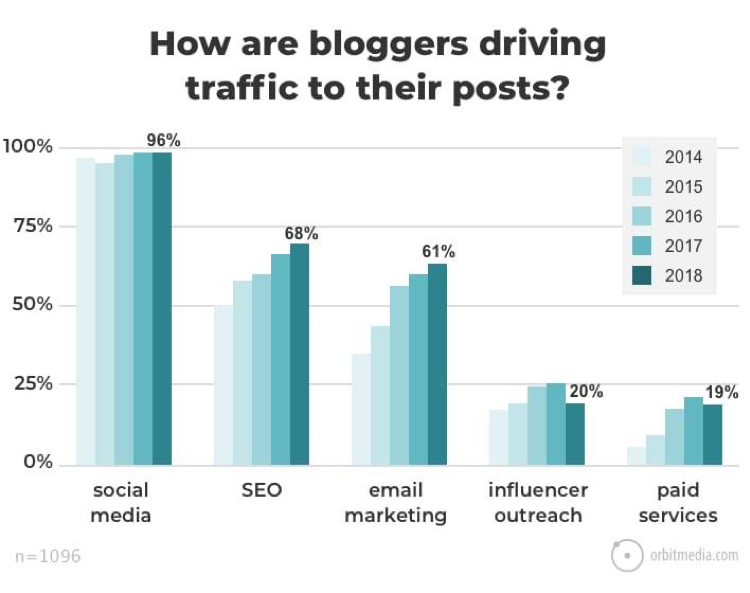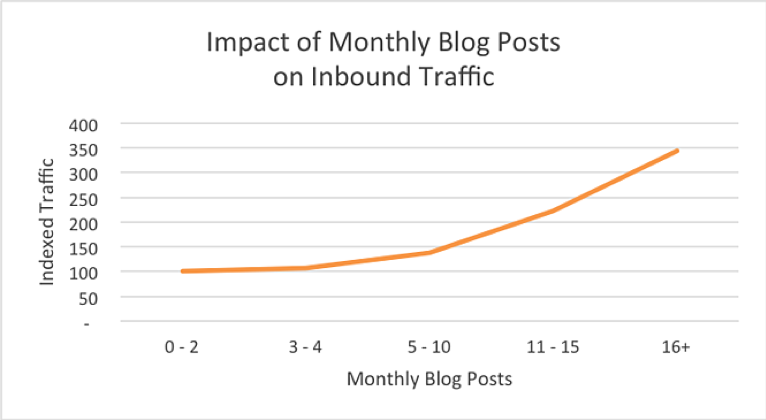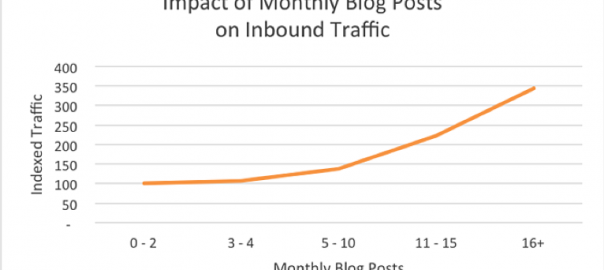“Content is king,” said Bill Gates over 20 years ago, and this maxim still remains true to this today. How could it not be? With platforms like WordPress that are free and that offer an amazing opportunity for the expression of ideas, there’s just no reason not to have a blog. Especially if you’re after the younger consumer.
A recent HubSpot study found that 55% of marketers say that blog content creation is their top inbound marketing priority. If you still don’t have a blog, consider getting WordPress and starting one. It’s currently the best platform, with no close second. It’s free, fast, has tons of functions and can be easily expanded with plugins.
On top of that, plenty of great hosting providers offer to host WordPress, and their services maximize the speed of your blog and make managing it easy. There’s no reason to skimp on a blog—it’s cheap and simple to do.
Here are nine reasons why you need to have a blog to successfully engage a young or millennial audience and how your blog can drive the growth of any business.
1. Blogs increase credibility
By having a blog and posting content that’s related to your business you’re showing visitors that you actually know what you’re talking about. For millennials, that means authenticity—and they love authenticity.
With a regular, high-quality blog, you can help customers get informed and make better decisions. You can post guides, comparisons, and basically anything that can help consumers. When you help visitors, you improve your relationship with them.
Apart from SEO, this is the main reason small business blogging has become so popular—it builds trust not just with millennial customers but consumers of all ages.
2. Blogs boost SEO scores
Google loves fresh content, but you probably don’t update your website very often. Not to worry, that’s where your blog comes in. Posting regularly on your business blog will make Google index your site more often, and that allows tech savvy younger consumers to find your stuff more easily, especially if you’ve built up a high search engine optimization (SEO) score.
Good SEO also means using targeted keywords. A blog can help you target any keyword you want, it can be a short- or long-tail keyword. All you need to do is pick the right terms and then craft a blog post around it. This can help boost your SEO scores and get consumers to your site.
3. Blogs drive web traffic
Blogs can lead to a huge overall increase in traffic to your site.
Some of your blog traffic will come from existing clients, of course, but the important thing is that some of it will be new visitors and thus are potential new customers.
A very important factor is that great blog posts lead to more sales. A good tactic is to include inbound links to your products or other pages that are related to the content the user is reading.
4. Blogs double as social media content
You’ve probably faced this issue before. You’ve already posted a lot of content in the past days, but now you don’t have anything to post. Blogging is a good way to never run out of social media content.
Have a new blog post ready to go? Share it to Facebook, Twitter, Linkedin, and any other social media platforms you use. Obviously, social media content reaches a younger demographic more quickly and easily than many other kinds of content. Blog posts are also high-quality content—or should be—and this results in driving high-quality traffic to your website. This is why most bloggers drive the majority of their traffic to their posts through social media.

Source: https://www.orbitmedia.com/blog/blogging-statistics/
5. Blogs generate leads
Marketing professionals that use blogs get 67% more leads than those that don’t.
It’s hard to promote an email newsletter without having a blog. Even if you do, what do your subscribers have to look forward to by subscribing?
By having blog, you have a very good basis for forming a great newsletter. On top of that, customers that like your blog will automatically want to subscribe to your newsletter to see more content. If you pair that with a free download or a coupon code, it’s easy to get visitors to subscribe. And because you have a blog, you have a lot of content to send to your subscribers.
Statistics say that if you post more, you’ll be generating a lot more leads—makes sense!

Source: https://blog.hubspot.com/marketing/blogging-frequency-benchmarks
6. Blogs create critical backlinks
The number of backlinks—or number of pages out there on the web that link back to a page on your site—is one of the most important factors in search engine ranking. Backlinks are created when you have content that is interesting enough so other sites start linking back to your site. Blogs are the prime content for this.
A unique blog post of a helpful nature can launch even SMB blogs into the sky. It only needs that first push to be recognized and linked to.
The reason for small business blogging is mostly backlinks. Large businesses already get plenty of backlinks, either through affiliates or plain recommendations. But even large businesses have blogs.
7. Blogs passively promote products and services
Business blogs generally don’t actively promote products or services. Passive promotion, where people think they’re buying instead of thinking that you’re selling, performs much better.
Promotion of products and services comes in the form of an explainer of that service or product. It can even be without any mention of your company if your customers already know what you’re doing.
Promotion can also come in the form of internal linking to your own products or services, optionally with a discount code or other promotional offer. When you inform and help young consumers, you’re much more likely to be viewed positively and as “authentic.”
8. Blogs are a kind of customer support
A business blog can help you provide better and faster customer support. Even before contacting customer support, your clients might search for an answer to their problem.
If your blog post pops up and helps them solve their problem, that’s a happy customer who doesn’t need to take any further steps. It also offloads the work from customer support and frees up time so they can focus on bigger problems. You’re also giving the customer the option of providing feedback, usually in the form of comments.
Small-to-medium business (SMB) blogs especially would be a good place to do this, as the budget limitations might be too restrictive to have a big support team.
9. Blogs humanize your brand
It’s the oldest sales saying: people buy from people.
This is why millennial influencers have a career. It’s why they’re paid so much to just wear clothes and go on a vacation paid by the clothing company. People, and especially millennials, want to buy from people they know and trust.
If you look at huge brands like Apple or Microsoft, you’ll notice that there’s a face on the brand—Steve Jobs or Tim Cook for Apple and Bill Gates for Microsoft. This is because the younger markets want to know who’s behind the company. It’s very important to them to know who’s making something, almost as important as knowing what they’re making.
A blog gives your business a personality and allows you to create a persona that millennials can form an attachment to. It lets them know that the company and the people who work for it also face the same problems they do, and so they can be a trusted source of information and aid. If there’s one thing millennials really do love, it’s quality advice from an authentic source.
So Get Blogging!
To get started, your primary investment is your time. Granted, time isn’t a small investment, but it’s definitely worth it to build up your credibility among younger consumers and generate more leads. These are things that are critical to any business.
If you keep posting high-quality optimized content, you’ll eventually increase your search rankings and might even appear on the first page for some keywords.
Digital & Social Articles on Business 2 Community
(58)
Report Post






